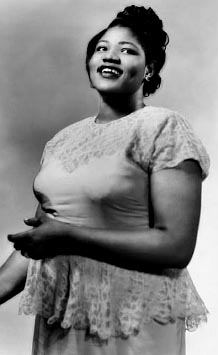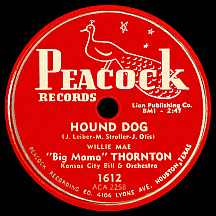WILLIE MAE "BIG
MAMA" THORNTON
Hound Dog
One of music history's more infamous recording sessions took place in Los Angeles in August of 1952; "Hound Dog," a tough-as-nails blues song written by Jerry Leiber and Mike Stoller (with input from Johnny Otis), came to life like an invigorating blow to the head thanks to Willie Mae Thornton's growling, whooping vocal style. With backing by Otis (using one of his pseudonyms, Kansas City Bill) and his orchestra, including down-and-dirty lead guitar work by Pete Lewis and loud barking supplied by band members, it was the big break producer-songwriters Leiber and Stoller had hoped for (so far they had notched just one hit, Charles Brown's "Hard Times," earlier in the year). For Willie Mae, about to be known to millions as "Big Mama" (an accurate moniker considering her nearly three hundred pound frame and imposing manner), it capped a difficult first year with the Peacock record label.
Mike Stoller claimed it took about 15 to 20 minutes to put the song together, after which the session commenced and he and Jerry proceeded to instruct Thornton on how they wanted her to deliver the vocal. Well, she wasn't too receptive: "Don't tell me how to sing no song, white boy!" was the way Mike has told it, but others have sworn she used stronger language. Turned out no coaching was necessary; the 25-year-old Thornton delivered the lines in an intimidating way that came natural to her ('You can wag your tail, but I ain't gonna feed you no more!') and with a suggestiveness beyond what the writers had envisioned ('You made me feel so blue, you made me weep and moan...'), striking gold in the process...after a waiting period, that is. Peacock held off on issuing the single until about six months later; it hit the rhythm and blues charts in March 1953 and was a surprise hit, spending most of April and May at number one. You'd think "Hound Dog" would be a done deal, Big Mama's song and hers alone, but in 1955 a cleaned-up version was recorded by Freddie Bell and the Bell Boys, on the Teen label, that changed the song's tone with replacement lyrics like '...you never caught a rabbit and you ain't no friend of mine.' Then about a year later a similar rendition by a young upstart named Elvis Presley (who by that time had a couple of chart-topping smashes in the can) became the only version to something like a billion music fans.
Willie Mae spent her formative years in rural towns near Montgomery, Alabama. She played harmonica and drums and sang in church (her father was a minister), later developing a vocal style inspired by some of the blues greats of the 1920s and '30s: Bessie Smith, Ma Rainey and Memphis Minnie. Her mother passed away when she was just 14 and within a year she had a manager, Sammy Green, who'd seen her in an amateur singing competition and hired her for his Hot Harlem Revue, a show that made the rounds of the southern states. It provided her with steady work as an entertainer through 1948, when she left Green's Revue and made Houston, Texas her home base, singing regularly at the Eldorado Ballroom and other nightspots. In 1950 she cut her first record as lead singer of The Harlem Stars for the Houston-based E&W Records; "All Right Baby" delivered a boogie-woogie roll as tough as they come.

Don Robey, the founder of Peacock Records, had a gangsterish aura about him. He employed personal bodyguards and literally ran his company with an iron fist, sometimes beating up his own recording artists if he thought they were giving him guff...all except Willie Mae, that is, whose size alone was reason enough for him to keep his distance. Her first disc for the label was "Partnership Blues," a splendid example of the blues set to a driving beat. A couple of singles with Bill Harvey's band dialed down the urgency a bit, revealing a command of blues phrasing seasoned beyond her years, but none of the early releases got off the ground. She made regular appearances at Robey's club, the Bronze Peacock, and toured with Johnny Otis and his band. Then "Hound Dog" hit the top and the newly-nicknamed "Big Mama" Thornton had a much higher profile, leading to classier venues, star billing and lots of extra cash to offset the fraction-of-a-penny-per-disc deal she had signed with Robey.
Rufus Thomas quickly released a somewhat off-color answer record, "Bear Cat" ('You can purr, pretty kitty, but I ain't gonna rub you no more'...growl: 'aaahhh, rub ya!'); the Sun release went as high as number three R&B in May '53 while Willie Mae was still at the top. She ultimately found notching a second chart hit to be nothing less than impossible. "They Call Me Big Mama" borrowed heavily from Fat's Domino's debut 1950 hit "The Fat Man," adjusted for a female protagonist. She was teamed with Johnny Ace, a big star on Peacock sister label Duke, and the hot, sexy, rocking "Yes, Baby" resulted, though her name wasn't credited on the label (several months later, on Christmas Eve, she was one of the witnesses when Ace accidentally but fatally shot himself backstage at a show in Houston). Perhaps her best chance at a follow-up hit came in the spring of '54 with "I Smell a Rat," another Leiber-Stoller number with Otis's orchestra supplying the backbeat, but it too fell by the wayside.
Big Mama was up for the excessive touring schedule, especially considering it was her main source of income. Eyebrows were raised when she began appearing onstage dressed like a man, leading to inevitable questions about her sexuality; she made no effort to hide her lesbian preference, a rarity at a time when nearly everyone kept such things hush-hush. Her last single for Peacock, "Just Like a Dog (Barking Up the Wriong Tree)," hit the streets blazing, but was perceived as little more than a desperate attempt to rekindle the magic of her one big hit. Wrong! Nevertheless, it went nowhere. By that time she'd had enough of Robey's rough stuff and in one of many disagreements (mostly having to do with money), she left the label for good.
Setting up stakes in Oakland, California around 1960, Big Mama had a couple of singles on the Bay-Tone label of San Francisco including "You Did Me Wrong" with her familiar "Hound Dog" growl intact. Throughout the 1960s she made records for several labels including Kent ("Before Day (Big Mama's Blues)") and Galaxy ("Life Goes On"), in fine form on a variety of blues and jazz-style numbers that in most cases she composed herself. Several albums of live and studio tracks were recorded for blues enthusiast Chris Strachwitz's Arhoolie Records. "Ball and Chain" was the closest she came to having a second hit after Janis Joplin discovered it and included a nine minute live version on Big Brother and the Holding Company's chart-topping '68 album Cheap Thrills. Thornton finally had one of her albums, Stronger Than Dirt on Mercury, reach Billboard's charts for a couple of weeks in the summer of 1969.
"Sing Out For Jesus," a gospel song penned by Kim Carnes, was recorded by Big Mama for the 1971 cult car chase film Vanishing Point. She performed for audiences almost to the end, captivating crowds at blues festivals and small clubs alike with her fabulous vocal ability, mean blues harp blowing, humorous asides and all those manly suits and hats she wore. Years of heavy drinking took its toll on her health and by the early 1980s the once-robust tractor-truck of a woman appeared quite thin and frail, though her vocal ability suffered little. When she died in 1984 at age 57, longtime friend Johnny Otis lamented the fact there had been more newspaper and media coverage on her death than she had seen throughout all of her post-"Hound Dog" years. When Presley's version of the song overshadowed the original, it seemed an unfair (though unintentional) blow, but increased recognition has come with the passage of time and Willie Mae "Big Mama" Thornton has taken her rightful place as one of the greatest music acts to emerge during the 1950s.


